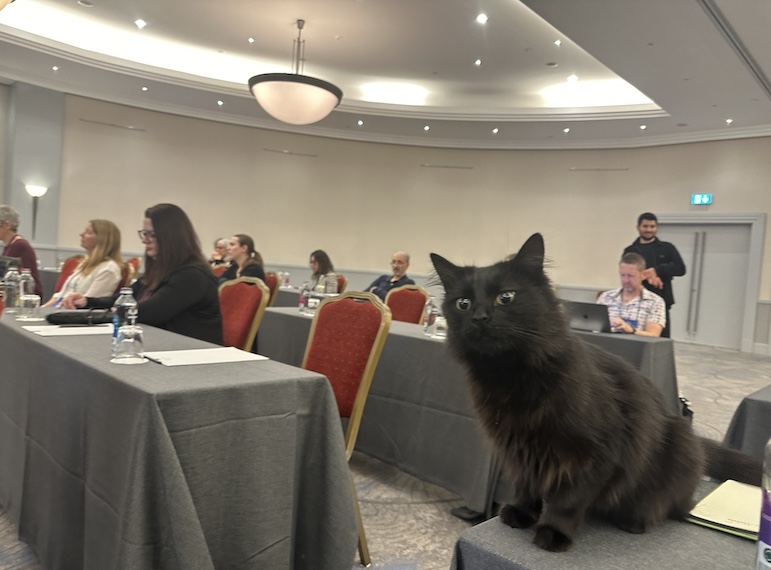
Lenore, one of the house cats living inside the Conrad Hotel in Istanbul, likes to attend business conferences whenever a convention is in town. Photo by Teresa Bergen
The eminent archeologist was explaining how the discoveries at Göbekli Tepe in southeastern Türkiye were changing the way people understood Neolithic history. But I was only halfway paying attention. Most of my focus was directed toward an affectionate tricolor tabby posing coquettishly in the foreground of the ruins.
This is a common situation in Türkiye, where an estimated five to 10 million cats, ranging between domesticated and feral, roam urban boulevards, lavish resorts, trendy shopping centers and country lanes. Tourists visiting Anatolia flood their Facebook feeds with feline photos: cats gazing soulfully over the Bosphorus Strait, cats lounging on cushions at street cafes, cats stalking through 10,000-year-old Neolithic archeological sites. In Istanbul, you’ll find street-dwelling felines lurking in and around structures that include Byzantine cathedrals, spice markets and Ottoman palaces.
Was this heaven on earth for cats? Or were fleas and ear mites lurking below the glossy surface? I set out to learn about the place of felines in Turkish society.
The Kedi Effect
Before I went to Türkiye, people urged me to watch a movie called Kedi, which means “cat” in Turkish. The 2016 documentary made by Ceyda Torun depicts the lives of the freewheeling cats of Istanbul, and their interactions with humans while describing their world from a feline perspective. Throughout the movie, people wax philosophical about cats. As one man says, “Cats know that people act as middlemen to God’s will. They’re not ungrateful, they just know better.”
When I watched this movie with my mostly indoor cat Lucifer, he was ready to pack his bag and move to Türkiye to escape my helicopter mommy parenting style. But beautiful as Kedi’s portrait of cat life was, I suspected it wasn’t all grace and glory for street cats.
I spoke with Sule, a British Turk living in Istanbul and chair of the UK-registered charity Help A Stray Cat. “The movie Kedi, similar to the cat videos you see on social media, portrays a romanticized version of the lives of stray cats in Istanbul,” said Sule, who chooses to use only her first name in her rescue work. “Contrary to popular belief, Istanbul is not a paradise for cats. No city in the world can be a paradise for stray animals.” She listed off the health problems street cats face, including parasites, cancer, eye infections, dental issues, kidney failure, chronic illnesses and getting run over by cars.
I concluded it’s a beautiful movie worth seeing, but viewers must realize there’s some poetic license going on here. It’s a bit like idealizing the carefree life of the train-jumping hobo.
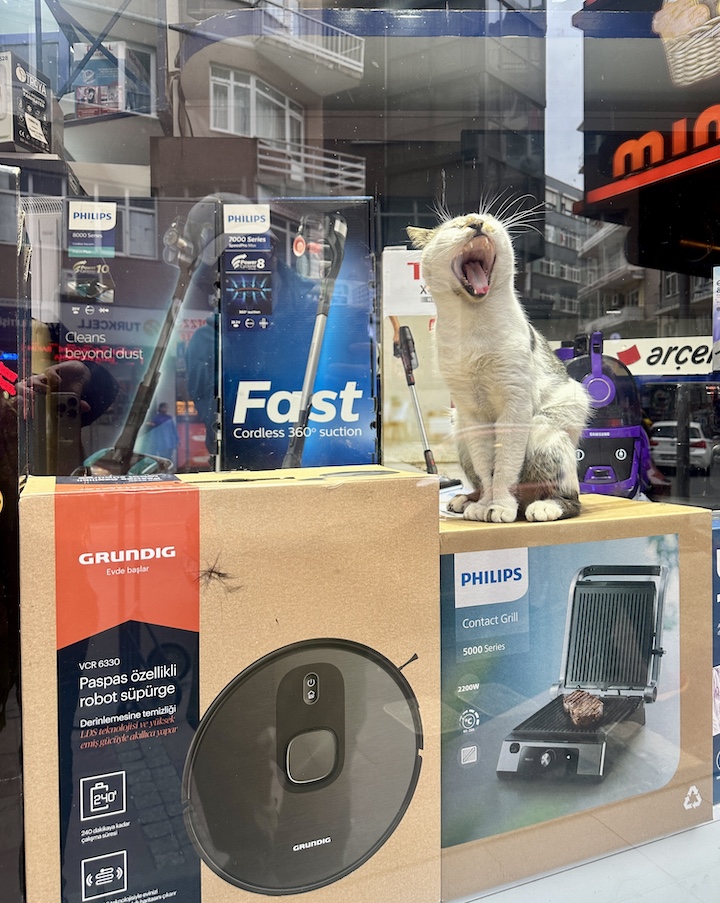
This sleepy cat lives a cushy life inside an Istanbul appliabce store. Photo by Teresa Bergen
Cats in Muslim Lore
Why does Türkiye have so many cats? Because they keep breeding. Many visitors wonder how the population got started. Partly, it’s because cats hold a special place in Muslim culture.
“In Islamic tradition, cats are revered animals, and historical figures like religious poet Rumi have highlighted their importance in literature,” Ozgur Nevres, a software developer and cat rescuer in Istanbul, wrote online. “According to legends, Rumi himself also had a cat.”
Several of the 13th-century Persian’s poems mention cats, including one with the line: “Be like the cat, so alive after the mouse, never wondering or questioning why, when there is really only God, only God…touching our paws.”
Gideon Lasco, a medical anthropologist based in the Philippines, mused about the cats of Istanbul after visiting Türkiye. “While some Muslims have ambiguous attitudes toward keeping dogs as pets, cats are considered ritually clean and have been historically favored, dating to the Prophet Muhammad who is said to have loved cats,” he wrote in the anthropology magazine Sapiens. “Notably, unlike in many other countries, feeding stray cats in restaurants or public places was generally not stigmatized. This frequent human interaction resulted in the cats often being very friendly, displaying a fondness for human affection.”
This was in line with my own observations across Anatolia. While I don’t doubt Sule for a second when she talks about all the problems of being stray, the street cats I met in Istanbul seem better off than those in some other countries I’ve visited. As somebody who’s been vaccinated for rabies because I can never stay away from strays, I’ve interacted with cats in several places. For example, when I’ve offered food to street cats in Qatar, Jordan and Georgia, they approach with varying degrees of caution, as though it might be a trap. In Türkiye, I had only to shake the bag of treats and cats would come running, many staying for a pat. The only cat that repeatedly swatted at me was one living in an upscale hotel. I suspect she was aggressive not from fear, but because she fancied herself too high-class for me.
One oft-told story of the Prophet Mohammed is that he cut off the sleeve of his robe rather than disturb his cat Muezza, who was sleeping on it. Mohammed was also known for feeding stray cats. And some tales claim that the M on the foreheads of tabbies stands for Mohammed—or maybe Muezza.
Islam bans the mistreatment of animals and requires good people to provide cats with food and water. Muslims who kill cats may find themselves in hell. Or at least expected to build a mosque to receive God’s forgiveness.
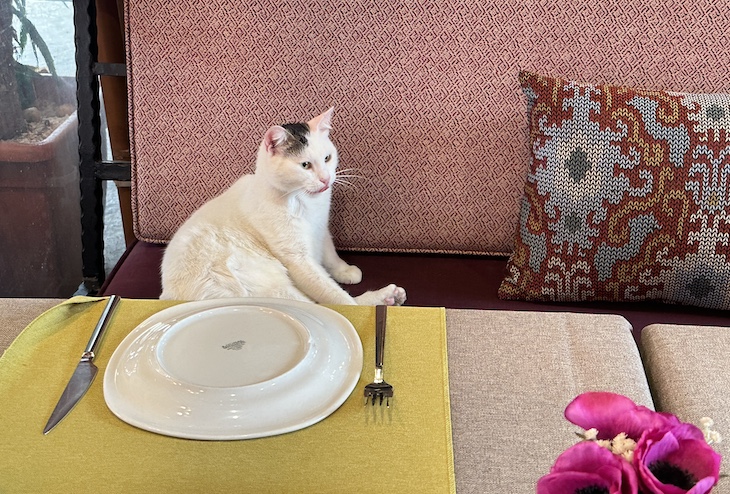
This contemplative kitty inside an Istanbul restaurant is keeping the seat warm for the next human guest. Offer her lunch and she’ll no doubt accept. Photo by Teresa Bergen
Feline Health and Community Care
Of course, religious rules don’t always translate into action. Many Turks care for street cats, especially in major cities like Istanbul, Ankara and Izmir. But there’s a shortage of volunteers and funds. “In the past two years, Türkiye’s economy has been facing major challenges,” says Sule, who personally cares for 50 street cats. “With annual inflation rates often exceeding 60% in 2023 and 2024, the cost of living and purchasing power has been affected significantly. As rescuers, we’re no longer able to care for as many animals as the cost of veterinarian fees and animal food is constantly increasing.”
Of Türkiye’s 1,389 municipalities, only 293 of them have their own feline shelters. Shelters are usually concrete buildings with few amenities. Many rural villages lack veterinary clinics. This means that even if people manage to feed street cats, they have no facilities for spaying and neutering. So, the population continues to swell.
Istanbul promotes free sterilization to contain kitty numbers. I was surprised when Sule told me that some people are against fixing cats. “Türkiye is a Muslim country, so some people think it’s inhumane to take away a cat’s ability to have kittens and become a mother,” she says. Sure enough, a Google search reveals a debate over the practice, including the idea that it’s wrong to alter a form that God created. Other Muslims believe that it’s fine to neuter cats, as long as it doesn’t cause them harm.
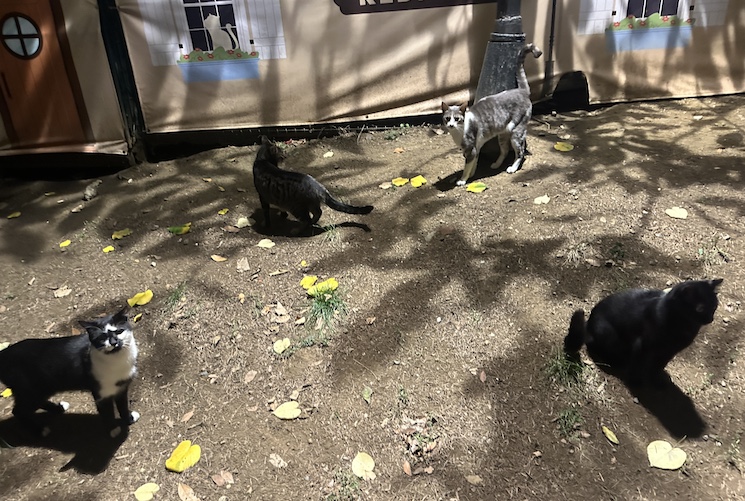
These four cats have their own house inside an Istanbul park. Photo by Teresa Bergen
Tourists and Cats
I figure that the more tourists post photos of their cat encounters on social media channels, the more Turks will see felines as a tourist asset, or even an amenity. Street dining with a street cat for company? Cat lovers swoon.
Nevres points out some characteristics of people who live in touristy districts where visitors incessantly snap cat pics. “Better-educated people tend to read more books, travel more, and as a result, develop stronger empathy skills, which extends to street animals and cats as well. Empathy alone isn’t enough. When people’s income levels rise, they have the luxury to think beyond their own immediate needs and can afford to help street animals.” Generally speaking, he writes, less affluent areas where tourists seldom venture may be less hospitable—sometimes even cruel—to street cats.
Help a Stray Cat constantly hears from tourists who want to help Anatolian felines. The simplest, shortest-term way to help street cats is to provide food and water or donate money and support initiatives that provide food and medical care. Sule suggests that if a tourist finds an injured or ailing cat, they take it to a veterinarian. Or they can adopt a cat and take it home. Help a Stray Cat specializes in finding homes in the UK but also works with tourists from Europe and the US. But be prepared. It’s a time-consuming process.
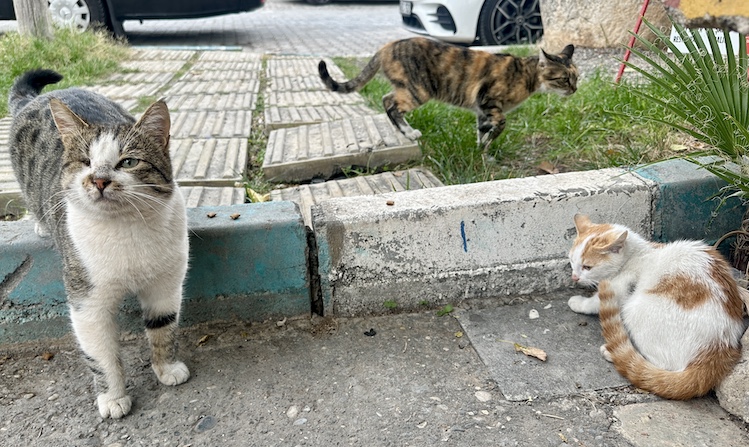
These cats in the small town of Halfeti are a little scruffier than their Istanbul cousins but friendly and eager for treats. Photo by Teresa Bergen
Sule struggles to find homes for cats within Türkiye. “There are stray cats on every corner. So, if someone wants to adopt a cat, they’re likely to take home a stray cat they come across on the street,” she says. And the cats she’s trying to place have had hard lives. “We only rehome animals who absolutely should not and cannot return to life on the streets.” Since cat ownership figures in the UK and US are much higher—about 25% versus 14% in Türkiye—Sule sends cats abroad.
If you love cats, bring an open heart to Türkiye. And load up on Costco-size bags of Temptations. You’ll make friends all around the country.
Portland-based Teresa Bergen’s previous stories for EWNS include an examination of sober travel and an account of a trip to the Galapagos Islands.

